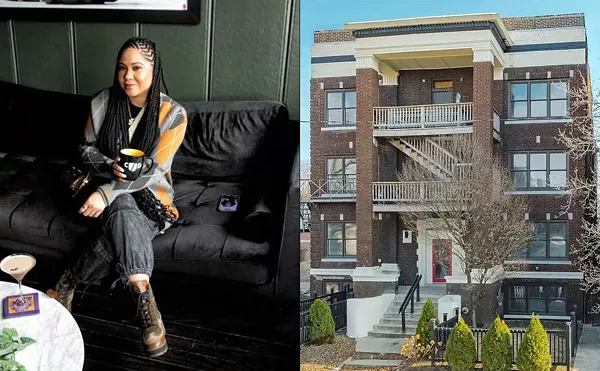
Audio By Carbonatix
[
{
"name": "GPT - Leaderboard - Inline - Content",
"component": "35519556",
"insertPoint": "5th",
"startingPoint": "3",
"requiredCountToDisplay": "3",
"maxInsertions": 100,
"adList": [
{
"adPreset": "LeaderboardInline"
}
]
}
]
Last week, with the glittering North American International Auto Show about to begin, Detroit’s mayor, facing a major financial crisis and a huge budget deficit, announced a vast number of layoffs and other spending cuts.
Those included an announcement that the city would no longer provide round-the-clock bus service for its residents, many of whom desperately need it.
And that is a view so coldly shortsighted as to be criminal.
“This is going to result in a lot of unemployment,” a discouraged-sounding Mike Whims told me. A retired engineer who spent his career in the oil and gas business, he is operations director for Transportation Riders United — TRU — a fairly new group whose modest goal is to do whatever it can to improve access to transportation in the greater Detroit area.
Now, in a city where some kind of reliable, convenient mass transit is clearly among the greatest needs, the needy just got another kick in the teeth. It needs to be said that whatever you think of Kwame Kilpatrick, the fact is that Detroit’s horrendous financial condition isn’t even mostly his fault. Even if the mayor has too often behaved more like the head of a frat house than the leader of a city in crisis, the problems that have led to the city’s current huge budget deficit have been building for decades. They badly need a solution.
Cutting off bus service to the desperately poor isn’t it.
By the way, the mayor’s announcement that the buses would no longer run through the night got little attention. Most of those flocking to the auto show to see the shimmering new cars and alluring models probably didn’t notice, and if they did, they probably couldn’t have cared less.
But the decision to curtail bus service may mean disaster — possibly even life and death — to some of the many Detroiters who work strange hours. What many people don’t understand is that today, perhaps one-quarter of the adults in the city that put the nation on wheels either cannot operate a car or haven’t money enough to afford one. Many other Detroiters rely on a single car that sometimes breaks down.
Now, when that happens, they too will be out of luck. What hours Detroit will be without buses wasn’t precisely clear when this column was being written, nor is it clear when the cuts will go into effect. However, the idea seems to be to stop providing bus service during the wee hours, perhaps from midnight to 4 a.m.
That may sound reasonable to you. But there are Detroiters who work in factories and bakeries and other jobs for which you have to show up or leave while most of the city sleeps. There are those who sometimes are left stranded or who have no car and are called on for an emergency errand. Imagine walking very far in a crime-ridden neighborhood in the freezing cold of a January night.
Marcia Yakes doesn’t have to imagine it. She lives in what city boosters like to call “Midtown,” and which she baldly and honestly calls the Cass Corridor. She’s disabled, unemployed and relies totally on the bus.
“Me? I’m 52 years old,” she tells me. “But If you subtract the time I’ve spent waiting for buses, I’m more like 40,” she says.
Working the bus system wasn’t easy to begin with. Think of this: There are far more jobs in the burbs than in the city; there are more people and more businesses there. At the same time, there are lots of people like Yakes who need jobs and would be happy to commute.
Lots of luck. Bob Prud’homme, an architect who lives in Ferndale, is TRU’s president. He tells me there’s no one place you can go, online or otherwise, to get a unified schedule for both city and suburban bus systems.
Is that crazy, or what? No crazier, perhaps, than many of the attitudes found on both sides of Eight Mile, but this one costs everyone money. We should have one community-wide bus service. Naturally, what we really need is a light-rail line along the Woodward corridor. That is, if we want to continue to pretend to be a functioning modern metropolis.
Employers need workers, and workers need a way to get to their jobs. That isn’t exactly socialism. Trouble is, the suburbs and the city are in love with blaming all their problems on each other, and sometimes seem incapable of cooperation, even when it clearly is in everyone’s best interests.
Some years ago, Yakes landed a job working for a fast-food restaurant in Madison Heights. With difficulty, she was able to navigate both bus systems to get there. But when her shift ended, she either needed to hitch a ride or walk six miles to find a bus that would get her home. Eventually, she quit.
Others working odd hours within the city limits are now likely to suffer the same desperate fate. When they don’t have jobs, they don’t pay taxes or spend money to help boost the economy, and the weakened city is further weakened.
Transportation Riders United has been fighting hard, with too little notice, to do something about this for several years. Remarkably, the group was started, not by romantic old liberals, but by a 14-year-old boy named Stephen Hands, who presented a remarkable paper arguing for mass transit at a forum six years ago. One of those on hand to hear him was then-Vice President Al Gore.
His parents, Lawrence Hands — now TRU’s treasurer — and Karen Kendrick-Hands, were so impressed they got TRU rolling. Stephen is off at Kenyon College now, working toward a future as an urban planner. TRU is starting to sprout wings; the group has put together an impressive board, and is now (see their Web site, detroittransit.org) advertising for a full-time executive director.
They are also about to have a historic annual meeting, open to the public, designed to help determine the group’s next priorities. The meeting begins at 6 p.m. next Tuesday night (Jan. 25) in the Guardian Building’s conference center, on that magnificent building’s 37th floor.
Saving overnight bus service is bound to be a top priority. But forming a real long-term strategy for mass transit is at least as important. We could use a cause that promises to make life better for all those who live in greater Detroit.
The unkindest cuts of all: What ought we to think about the rest of the mayor’s budget-balancing moves, which included eliminating nearly a thousand jobs? Looked at one way, he had no choice; the books must be balanced by law.
Yet the cuts appear to do nothing but buy a little time before the city collapses into receivership, in which case everyone’s worst fears are bound to be realized.
What he needs to do is use his famous charm to get everyone in Lansing to realize that we have a vast crisis on our doorstep, and the city, the suburbs and the state have to come together and figure it out — and I don’t mean just short-term, stopgap solutions. Otherwise, the area will essentially be doomed.
That’s not an exaggeration. We can make this area work — we can make Detroit a city to which people want to come again — if everyone wants to act responsibly and pull together. Otherwise, blacks will lose political power anyway, the suburbs will pay the freight anyway — and everything will still be a mess.
Jack Lessenberry opines weekly for Metro Times. Send comments to letters@metrotimes.com




